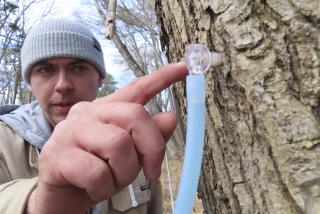Chris Christie bridge scandal looks to many like Jersey as usual
HADDONFIELD, N.J. — A four-day traffic hell that trapped cars headed to one of the nation’s busiest bridges, supposedly engineered by gleeful political operatives as payback: Deeply stupid, for sure. Unbelievably vindictive and petty. And, in its way, so quintessentially New Jersey.
The George Washington Bridge scandal that has engulfed Gov. Chris Christie, bizarre as it is, also somehow stands as an example of the state’s hardball political traditions.
In the Garden State, political bosses have never gone out of style, corruption cases pile up more victims than the Sopranos, and elbow-to-the-face tactics are shrugged off by voters — as much a part of Jersey culture as boardwalk custard and stainless-steel diners.
The state has an outsized history of sleaze and outright public thievery. Frank Hague, boss of Hudson County for three decades, had a desk with a specially designed drawer that could be pushed out toward a visitor, the better to receive a discreetly dropped envelope full of cash. There were a lot of envelopes: When he retired, he was said to be worth $10 million.
Other ethically challenged New Jersey politicians have become enshrined in popular culture: cable TV’s popular “Boardwalk Empire” features a bloodier version of Atlantic City boss Enoch “Nucky” Johnson, and the new movie “American Hustle” is based on the Abscam sting that took down a U.S senator from New Jersey, the mayor of Camden and six congressmen.
READ: Controversial Christie staffer emails
“If you look at the big-city mayors of the state, it’s usually the express lane to the penitentiary,” said Republican political consultant Steve Schmidt, who suggested that the bridge scandal fell somewhere near the state’s norms. “As stupid as this is, it’s not necessarily going to make someone familiar with New Jersey politics fall out of their chair.”
And the cases keep coming, as colorful as ever. Even as Christie was at the gold-domed State House on Thursday, blaming the Fort Lee mess on his aides, the mayor of Trenton was going on trial down the street at the federal courthouse as a result of an FBI bribery sting.
Mayor Tony Mack is accused of working with Joseph “JoJo” Giorgianni, a rotund sandwich shop owner and convicted sex offender, to take bribes from an informant to smooth the way for a parking garage project that never really existed. Giorgianni referred to himself as “St. Joseph,” prosecutors told jurors, as in: “St. Joseph always provides.”
By New Jersey standards, the Trenton case is pretty ho-hum; the FBI here has been using that same crooked-businessman ploy to bring down mayors and other officials for decades. In 2009, a money-laundering and corruption investigation ensnared 44 people, including several mayors, as well as a rabbi who pleaded guilty to running an illegal operation to sell kidneys to people needing transplants.
“I guess that’s evidence of the culture,” said Brigid Callahan Harrison, a professor at Montclair State University who has studied New Jersey political corruption. “When politicians are approached with this, they don’t automatically think, ‘sting operation.’ They think, ‘business as usual.’”
The bridge mess, which emails from Christie aides suggest was political retaliation, perhaps for the Fort Lee mayor’s failure to endorse Christie’s reelection, “underscores the already held perception of seediness and thuggery in New Jersey — and particularly New Jersey politicians,” she said.
Christie, a Republican, came into office in 2009, vowing to wipe out that low-rent reputation. When he served as United States attorney in New Jersey, Christie made a reputation as a corruption buster, prosecuting 130 corruption cases involving both Republicans and Democrats; on his office website, he says he never lost one.
Since taking office, Christie has reveled in a tough-guy political style. “I am who I am,” he said Thursday. “But I am not a bully.”
Yet former Gov. Thomas Kean, a Republican who met Christie when he was a 14-year-old volunteer on Kean’s campaign, said the incident would play into Christie’s reputation as a man with an “enemies list.” (The duo’s relationship has itself fallen to a Jerseyesque move: Christie angered Kean recently when he teamed up with Democrats to try to unseat Kean’s son as minority leader in the state Senate. The attempt failed.)
“Nobody around Christie is going to say no to him,” Kean said.
PHOTOS: Scenes from “Bridgegate”
Kean called the epic traffic jam baffling, particularly since the New Jersey governor’s office, considered the most powerful in the country, offers any number of more artful opportunities to take revenge. The governor has sweeping powers over ostensibly independent agencies (such as the one that runs the bridges), the power to appoint nearly all statewide officials, including judges and the attorney general, and a line-item veto.
“You can fool around with the projects of every mayor in the state, if that’s what you want to do,” Kean said. “If I wanted to do something like that, that’s the way I would do it. There’s no fingerprints.”
There are other things that make New Jersey unusual: This smallish state has 565 municipalities and 590 school districts, each one an opportunity to award contracts and jobs to political insiders. A patronage tradition is still alive and kicking; Christie, like governors before him, stuffed the Port Authority of New York and New Jersey with dozens of supporters, including an old high-school classmate on the receiving end of the now-infamous email: “Time for some traffic problems in Fort Lee.”
And the state still has influential unelected power brokers such as South Jersey Democrat George Norcross, who has formed an alliance with Christie on some issues.
“Normally one party is a check on the other party,” said Republican political consultant Roger Stone, a veteran of New Jersey campaigns. “In New Jersey, they get together and figure out a way they all can benefit.”
TIMELINE: The year in politics
Some say New Jersey’s reputation as a haven for scandal is overblown. One study found that measured by convictions per capita, the state ranked as only the seventh-most corrupt in the U.S. And a 2012 study by Washington good-government groups found that New Jersey, judged by its strong ethics codes and public records laws, actually ranked as the least corrupt and most transparent state in the nation — at least on paper. Some here may have found that amusing, but not Ben Dworkin, director of the Rebovich Institute for New Jersey Politics at Rider University.
Convinced the state gets a bad rap, he says he has to work every year to persuade his students that New Jersey government is more than just a punch line.
“New Jersey politics is a full-contact sport,” Dworkin said. “That doesn’t mean it’s corrupt. It just means people are aggressive.”
Bob Ingle, a political columnist for Gannett newspapers in Trenton, said he noticed the difference right away when he moved from Sacramento. “There’s an aggression in the culture here,” he said. “There’s also a higher tolerance for people involved in corrupt activities in public life.”
When Ingle co-wrote a history of New Jersey corruption called “The Soprano State,” he said his challenge was that many real-life stories were almost too weird to be true.
“The publisher made me go back in and put in: ‘We’re not making this stuff up,’” said Ingle. “There is just something about New Jersey that’s hard to put your finger on. You just see some incredible things.”
More to Read
Start your day right
Sign up for Essential California for news, features and recommendations from the L.A. Times and beyond in your inbox six days a week.
You may occasionally receive promotional content from the Los Angeles Times.







